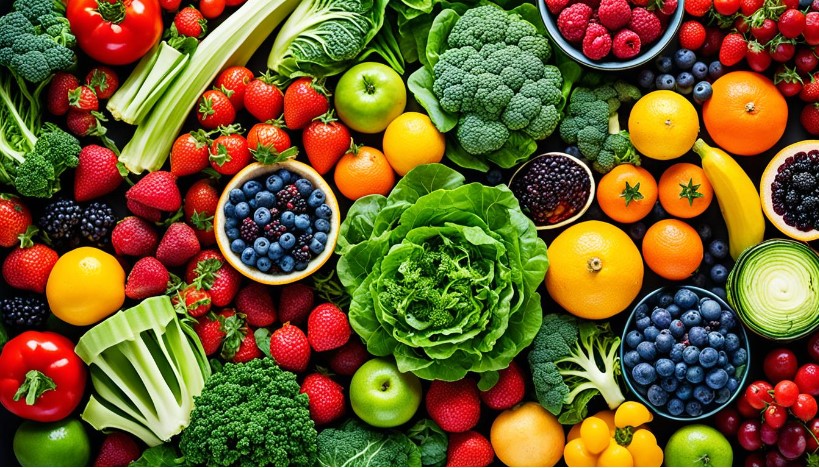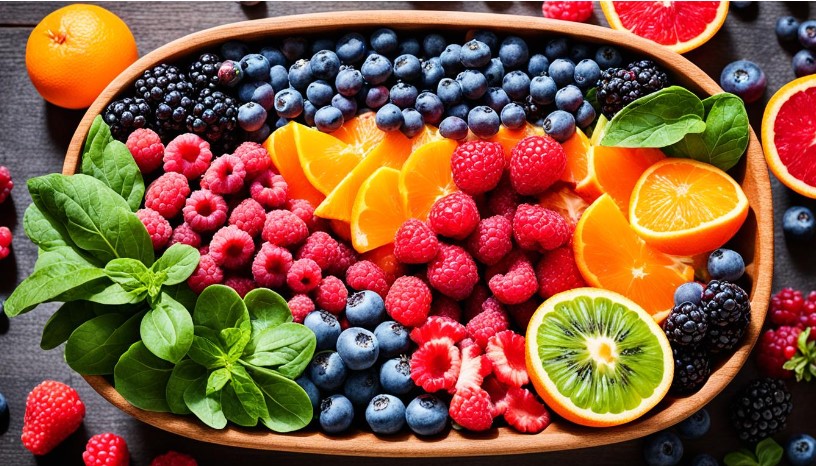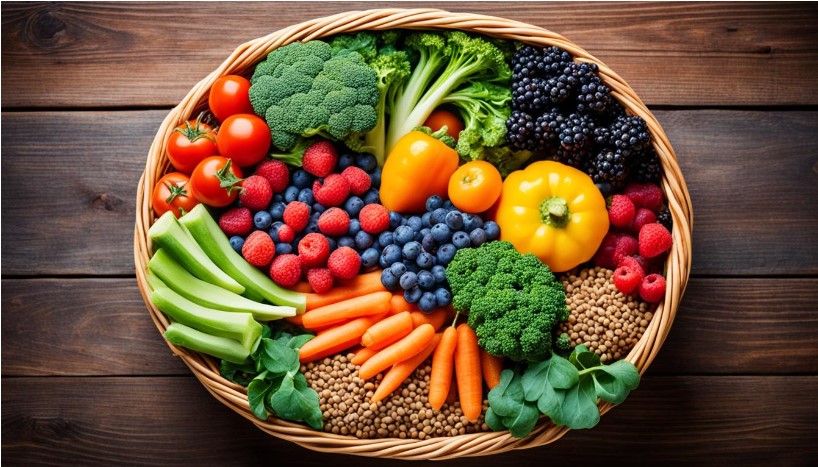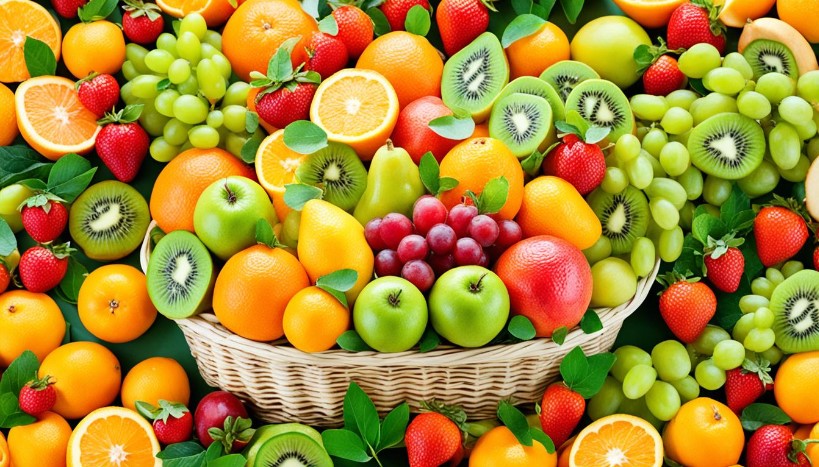Keeping a diet balanced and rich in nutrients is key for good health. We’ve worked with a leading registered dietitian to highlight 20 of the healthiest fruits and foods. These include antioxidant-rich superfoods and fiber-rich produce. They support a strong immune system, lower disease risk, and enhance physical health.

Key Takeaways
- Nutrient-rich fruits and vegetables are essential for optimal health
- Antioxidant-rich foods can help reduce inflammation and disease risk
- High-fiber foods support digestive health and can aid in weight management
- Vitamin C-packed citrus fruits and other produce boost immune function
- Leafy greens and cruciferous vegetables are packed with disease-fighting nutrients
The Importance of Eating Nutrient-Rich Foods
Keeping a diet rich in nutrient-dense fruits and vegetables is key for good health. These foods are full of vitamins, minerals, and antioxidants. They help with many bodily functions, like immune system health and heart health.
Understanding the Role of Fruits and Vegetables in Overall Health
Fruits and vegetables are vital for a healthy diet. They offer many nutritional benefits that lower the risk of chronic diseases. Eating a variety of colorful produce daily ensures you get a broad range of nutrients.
The Benefits of Consuming a Variety of Whole, Unprocessed Foods
- Whole, unprocessed nutrient-rich produce is generally higher in fiber, which can aid in digestion and support a healthy gut.
- These foods are less likely to contain added sugars, salt, and unhealthy fats that can contribute to chronic health issues.
- Consuming a diverse range of whole foods can help to ensure you’re getting a comprehensive mix of vitamins, minerals, and antioxidants that work synergistically to promote overall well-being.
By choosing nutrient-rich, whole-food options, you set the stage for a healthier, more balanced diet. This diet supports your body’s optimal function.

Healthiest Fruits And Foods for Antioxidant Power
Incorporating antioxidant-rich foods into a balanced diet is essential for health. These nutrients neutralize harmful free radicals, which can lead to chronic diseases and aging. Nature offers a wealth of nutrient-dense produce that excel in antioxidant protection.
The blueberry stands out among these foods. These small fruits are loaded with anthocyanins, powerful compounds that neutralize free radicals. They boost brain function, reduce inflammation, and support healthy aging.
The pomegranate is another antioxidant giant. Its seeds and juice are full of polyphenols and ellagic acid. These compounds protect cells from oxidative stress. Regular consumption may lower blood pressure, enhance heart health, and fight cancer cells.
| Antioxidant-Rich Foods | Key Antioxidant Compounds | Health Benefits |
|---|---|---|
| Blueberries | Anthocyanins | Improved brain function, reduced inflammation, healthy aging |
| Pomegranates | Polyphenols, ellagic acid | Lowered blood pressure, improved heart health, cancer-fighting properties |
| Kale | Carotenoids, flavonoids | Enhanced immune function, reduced cancer risk, improved detoxification |
| Ginger | Gingerol, shogaol | Reduced inflammation, improved digestion, enhanced antioxidant status |
Other top choices include kale and ginger. Kale is rich in carotenoids and flavonoids, while ginger contains gingerol and shogaol. Adding these foods to your diet helps protect against free radicals and supports overall health.

Top Fiber-Rich Fruits and Vegetables
Incorporating a variety of fiber-rich fruits and vegetables into your diet can provide remarkable benefits for your overall health. These nutrient-packed options not only support digestive well-being but also contribute to heart health and weight management.
The Advantages of a High-Fiber Diet
Dietary fiber is crucial for a healthy gut. It regulates bowel movements, promotes beneficial gut bacteria, and reduces the risk of conditions like constipation, hemorrhoids, and diverticulitis. Moreover, fiber-rich foods can lower cholesterol levels, manage blood sugar, and keep you feeling full, aiding in weight loss efforts.
Some of the top fiber-rich fruits and vegetables include:
- Raspberries – 8 grams of fiber per cup
- Pears – 6 grams of fiber per medium fruit
- Avocados – 13 grams of fiber per medium fruit
- Broccoli – 5 grams of fiber per cup
- Lentils – 16 grams of fiber per cooked cup
- Artichokes – 10 grams of fiber per medium artichoke
| Fiber-Rich Produce | Fiber Content per Serving |
|---|---|
| Raspberries | 8 grams per cup |
| Pears | 6 grams per medium fruit |
| Avocados | 13 grams per medium fruit |
| Broccoli | 5 grams per cup |
| Lentils | 16 grams per cooked cup |
| Artichokes | 10 grams per medium artichoke |
By incorporating these fiber-rich fruits and vegetables into your meals and snacks, you can enjoy a range of health benefits. These include improved gut health, enhanced heart function, and better weight management.

Vitamin C Powerhouses: Citrus and Beyond
Vitamin C is essential for a healthy immune system, skin health, and antioxidant benefits. While citrus fruits are famous for their high vitamin C content, other fruits and vegetables are equally valuable. They offer significant health benefits.
Oranges, lemons, limes, and grapefruits lead the pack in vitamin C content. These citrus fruits are loaded with the nutrient, enhancing your daily intake. Yet, don’t miss out on these other vitamin C-rich foods:
- Red bell peppers – A top non-citrus source of vitamin C, with a single cup offering over 150% of the daily recommended amount.
- Kiwi – This fruit is a great source of vitamin C, with one medium kiwi nearly meeting the daily recommended intake.
- Broccoli – Rich in vitamins and minerals, broccoli also has a lot of vitamin C. One cup gives you over 130% of the daily value.
- Strawberries – These berries are tasty and packed with vitamin C. One cup provides nearly 150% of the recommended daily intake.
Adding a mix of vitamin C-rich fruits and vegetables to your diet supports a strong immune system, glowing skin, and effective antioxidant protection.

Immunity-Boosting Superfoods
Keeping a strong immune system is key to overall health and wellness. Luckily, there are certain foods packed with nutrients that can significantly enhance the body’s defense mechanisms. These foods are loaded with vitamins, minerals, and antioxidants crucial for a robust immune response.
How Specific Nutrients Support a Strong Immune System
For a healthy immune system, it’s essential to eat a variety of nutrient-dense superfoods. These foods are rich in nutrients that help the body fight infections and diseases. Here are some top superfoods and their immune-supportive benefits:
- Vitamin C: Citrus fruits, bell peppers, and leafy greens are packed with vitamin C. This antioxidant boosts white blood cell and antibody production, aiding in disease prevention and wellness.
- Zinc: Vital for immune cell development and function, zinc is found in oysters, red meat, and legumes. These foods are excellent for immunity-boosting.
- Vitamin E: Nuts, seeds, and avocados are rich in vitamin E, an antioxidant that supports the immune system, making them top nutrient-dense superfoods.
- Probiotics: Foods like yogurt, kefir, and kimchi are fermented and contain beneficial bacteria. These help maintain a healthy gut microbiome, which is essential for immune function.
By adding these immunity-boosting foods to your diet, you can significantly enhance your immune system. This supports your overall health and wellness.
Nutrient-Dense Leafy Greens to Incorporate
Leafy green vegetables are essential for a diet rich in nutrients. They are loaded with vitamins, minerals, and antioxidants. These elements support health and well-being.
The Versatility of Leafy Greens in Meals and Snacks
Leafy greens fit easily into various meals and snacks, making them a great choice for any diet. They can be added to salads, smoothies, stir-fries, and wraps. This versatility makes them a convenient and nutritious option.
Some of the most nutrient-dense leafy greens include:
- Kale – Rich in vitamins A, C, and K, as well as fiber and antioxidants.
- Spinach – Packed with folate, magnesium, and a variety of beneficial plant compounds.
- Swiss chard – Offers a wealth of vitamins, minerals, and anti-inflammatory properties.
- Romaine lettuce – A flavorful base for salads that provides vitamin K and other nutrients.
- Arugula – Known for its peppery taste and high levels of vitamins A and K.
Adding these leafy greens to your meals and snacks is an easy way to increase your diet’s nutritional value. It supports overall health and wellness.
Berries: Nature’s Antioxidant Superstars
Berries are celebrated as “superfoods” for their high antioxidant levels. These fruits are loaded with nutrients that shield the body against oxidative stress and chronic diseases. By adding a mix of berries like blueberries, raspberries, blackberries, and strawberries to your diet, you can significantly boost your health.
These fruits are famous for their antioxidant properties, which neutralize free radicals and decrease inflammation. Studies show that consuming berries can lower the risk of cancer, improve heart health, and enhance brain function. Adding berries to your diet may also delay cognitive decline and support brain health as you age.
| Berry | Key Nutrients | Health Benefits |
|---|---|---|
| Blueberries | Vitamin C, Vitamin K, Manganese | Improve brain function, support healthy aging, reduce inflammation |
| Raspberries | Fiber, Vitamin C, Manganese | Promote gut health, support heart health, aid in disease prevention |
| Blackberries | Vitamin C, Vitamin K, Fiber | Enhance cognitive performance, lower risk of chronic diseases, support skin health |
| Strawberries | Vitamin C, Folate, Potassium | Boost immune function, promote healthy blood sugar levels, reduce oxidative stress |
Adding a mix of berries to your meals is an easy way to increase your intake of antioxidant-rich foods. Enjoy them as a snack, mix them into your oatmeal, or blend them into smoothies. These fruits are a great addition to your efforts in preventing diseases and maintaining cognitive health.
Disease-Fighting Cruciferous Vegetables
Cruciferous vegetables, including broccoli, cauliflower, and Brussels sprouts, are celebrated for their disease-fighting abilities. These vegetables are loaded with phytonutrients that can lower the risk of cancer and other chronic diseases.
The Cancer-Preventive Properties of Cruciferous Veggies
These vegetables contain compounds like glucosinolates and indoles, which have anti-cancer effects. These compounds neutralize carcinogens, stop tumor growth, and support cell health. Studies show that eating cruciferous veggies regularly can reduce the risk of breast, prostate, and colorectal cancers.
Cruciferous vegetables are also packed with fiber, vitamins, and minerals. These nutrients support a healthy immune system, improve digestion, and reduce inflammation. This makes them key to disease prevention.
To get the most from these vegetables, try to eat a variety of them often. Some of the most nutrient-dense cruciferous veggies include:
- Broccoli
- Cauliflower
- Brussels sprouts
- Kale
- Cabbage
- Arugula
Enjoy them raw, roasted, or in your favorite recipes. Cruciferous vegetables are a strong part of a diet that fights disease.
Healthy Snack Options for On-the-Go
In today’s fast-paced world, it’s often hard to prioritize healthy eating. Luckily, there are numerous healthy snacks that fit seamlessly into our busy lives. These portable options not only boost energy levels but also aid in maintaining balanced eating and ensuring adequate nutrient-rich foods intake.
Fresh fruit stands out as a prime example of a quick and nutritious healthy snack. Options like apples, bananas, and grapes are not only easy to carry but also packed with fiber, vitamins, and antioxidants. For a more filling snack, consider pairing your fruit with nuts or a bit of cheese. This combination provides a well-rounded nutritional profile.
- Fresh Fruit (Apples, Bananas, Grapes)
- Nuts (Almonds, Cashews, Walnuts)
- Cheese Slices
- Carrot or Celery Sticks with Hummus
- Greek Yogurt with Berries
- Hard-Boiled Eggs
Pre-portioned vegetable snacks, such as carrot or celery sticks with hummus, are another excellent choice. Greek yogurt with berries is also a great option, offering both taste and nutritional value.
Having a selection of healthy snack choices readily available ensures that you can easily maintain a diet rich in nutrient-rich foods. This approach supports your overall health and wellbeing.
Balancing Your Diet with Wholesome Foods
For optimal health and wellness, a balanced, nutrient-rich diet is crucial. By adding more of the healthiest fruits and vegetables to your daily meals, you enhance your diet’s quality. This approach ensures you benefit from the vast advantages of whole, unprocessed foods.
Tips for Incorporating More Fruits and Veggies into Your Routine
Adding fruits and vegetables to your balanced diet is a straightforward method to foster a healthy lifestyle. Here are some practical tips to begin:
- Begin your day with a nutrient-packed smoothie, blending whole foods like leafy greens, berries, and nut butter.
- Boost your fruit and vegetable intake by targeting at least five servings daily, as advised by health professionals.
- Discover new, vibrant fruits and vegetables to enrich your diet with a broad spectrum of vitamins and minerals.
- Integrate more leafy greens into your meals, such as spinach, kale, or arugula, which are nutrient-dense.
- Opt for healthy snacks like berries, carrots, or celery over processed snacks.
By implementing these small, sustainable dietary changes and embracing the wealth of wholesome, nutrient-rich fruits and vegetables, you’re on the path to a healthier, more balanced lifestyle.
More Articles Related To Health Checkout
Conclusion
Integrating the healthiest fruits and foods into your diet unlocks numerous benefits for your health and well-being. These foods are crucial for a balanced, nourishing lifestyle. They help boost your immune system and lower the risk of chronic diseases.
By adding a variety of these fruits and vegetables to your meals and snacks, you significantly improve your physical and mental health. Antioxidant-rich berries, fiber-packed leafy greens, and immunity-boosting superfoods are key to a balanced diet. They help you lead a healthier lifestyle.
Regularly consuming these nutrient-dense options supports your body and mind fully. This sets the stage for a vibrant, fulfilling life. The journey to optimal health is ongoing, but consistent intake of the healthiest fruits and foods is a crucial step.
Embrace the power of these top produce choices. Start a path towards a healthier, happier you. This approach leads to a more nourishing, balanced, and sustainable lifestyle.
FAQ
What are some of the healthiest fruits and foods to incorporate into my diet?
A registered dietitian suggests including antioxidant-rich superfoods, fiber-packed produce, and nutrient-dense leafy greens in your diet. Examples include berries, citrus fruits, cruciferous vegetables, and wholesome, unprocessed foods.
Why is it important to eat a diet rich in nutrient-dense fruits and vegetables?
Eating a diet rich in nutrient-dense fruits and vegetables is vital for maintaining overall health and wellness. These foods are loaded with essential vitamins, minerals, and antioxidants. They support immune function, reduce disease risk, and enhance physical and cognitive health.
What are some of the top antioxidant-rich “superfoods” I should be eating?
Top antioxidant-rich “superfoods” include blueberries, pomegranates, kale, spinach, and other nutrient-dense produce. These foods are high in plant compounds that neutralize harmful free radicals. This can reduce the risk of chronic diseases.
What are the benefits of consuming a high-fiber diet?
Incorporating fiber-rich fruits and vegetables into your diet offers numerous health benefits. These include improved digestion, better heart health, and effective weight management. Top fiber-packed options include raspberries, broccoli, and lentils.
What are some excellent sources of vitamin C in my diet?
Aside from citrus fruits, many other foods are high in vitamin C. Examples include bell peppers, kiwi, and tomatoes. Consuming a variety of these vitamin C-rich foods supports a healthy immune system, promotes skin health, and provides antioxidant protection.
Which “superfoods” are particularly beneficial for boosting my immune system?
Certain “superfoods” like garlic, ginger, and mushrooms are known for their immune-boosting properties. They are rich in vitamins, minerals, and antioxidants. Adding these foods to your diet can strengthen your body’s defenses against illness and disease.
What are some of the most nutrient-dense leafy greens I should be eating?
Leafy greens like kale, spinach, Swiss chard, and arugula are highly nutrient-dense. They are packed with vitamins, minerals, and plant compounds that support overall health and wellness. These greens can be easily added to various meals and snacks.
Why are berries considered “antioxidant superstars”?
Berries, such as blueberries, raspberries, and blackberries, are known as “antioxidant superstars.” They are rich in plant compounds that protect the body against oxidative stress and chronic disease. Regular consumption of berries offers valuable health benefits.
What are the cancer-preventive properties of cruciferous vegetables?
Cruciferous vegetables, including broccoli, cauliflower, and Brussels sprouts, contain phytonutrients that fight disease and prevent cancer. Adding these vegetables to your diet can lower the risk of certain cancers and chronic health conditions.
What are some healthy snack options I can have on-the-go?
Healthy snack options include nutrient-rich fruits and vegetables, perfect for on-the-go. Examples include apple slices, carrot sticks, cherry tomatoes, and fresh berries. These snacks support a balanced diet and enhance overall health and wellness.
How can I incorporate more fruits and vegetables into my daily routine?
To increase your fruit and vegetable intake, try adding them to meals and snacks, blending them into smoothies, or keeping pre-cut produce handy. Exploring new and diverse produce can make a balanced diet more enjoyable and sustainable


2 thoughts on “20 Healthiest Fruits And Foods to Eat, According to a Dietitian”